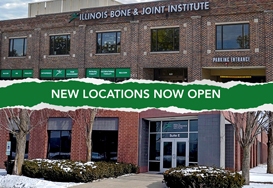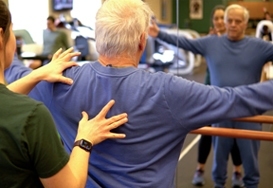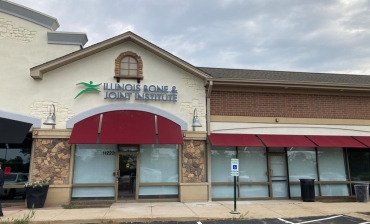With the arrival of spring, IBJI’s athletic training staff is gearing up for a busy season. The Chicago Red Stars of the National Women’s Soccer League and the Chicago Sky of the Women’s National Basketball Association have selected IBJI as their Official Athletic Training Provider. During the upcoming 2017 seasons, IBJI’s highly skilled team of certified athletic trainers will be on-site to assist both teams during all home and away games — but that’s not all they will be doing.
Sports fans everywhere are familiar with the sight of an athletic trainer sprinting out onto the court or field to assess an athlete’s injury. Less well known are the important roles that athletic trainers are playing in orthopedic specialty settings. Increasingly, athletic trainers are being called upon to fill new clinical roles because the medical community and certainly practices like IBJI are recognizing their unique qualifications.
During appointments with an IBJI orthopedic specialist, patients are likely to see and interact regularly with an athletic trainer working as a physician extender on the physician’s personal staff. “Athletic trainers have such great knowledge of musculoskeletal injuries and act as an extension of our orthopedic surgeons,” explains Melody Winter-Jabeck, Administrator at IBJI’s Glenview/Wilmette division. “They have a deep understanding of the patient’s medical condition, whether it be a fracture, sprain or something more complex. They assist in triage, surgery scheduling, patient education, and they are there for follow-up visits. They serve as a resource for the patient throughout the whole process.”
According to Winter, the education and clinical training that athletic trainers receive is especially valuable in an outpatient orthopedic setting. “Our athletic trainers have advanced understanding of physiology. They are an excellent liaison between the surgeon and the physical therapist because they understand the roles and responsibilities of each and how the pieces should fit together.”
Some of IBJI’s athletic trainers also serve as rehabilitation clinicians, working closely with physical therapists to assist in the care of patients after an injury or surgery. “Having athletic trainers and physical therapists co-treat patients who are undergoing rehab is a natural fit,” explains Matt Repa, IBJI’s Head Athletic Trainer. “Bringing together the two roles gives the athlete a comprehensive program that will get him or her back out onto the field or the court safely. IBJI’s athletic trainers have been closely involved in the development of our ‘Return to Play’ program, which is designed to bridge the gap between traditional physical therapy and getting the athlete ready for the demands of their sport,” says Repa. “The athletic trainers at IBJI are so well matched to this kind of work that they are serving as an invaluable resource for physical therapists and the athletes they assist.” According to Repa, athletic trainers are quickly establishing themselves as leaders in the management and care of athletes throughout their recovery.




